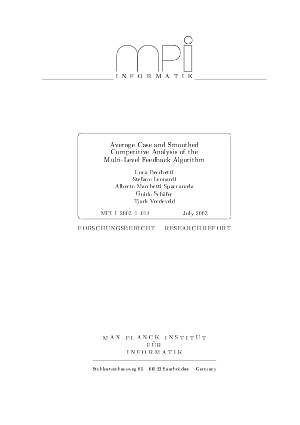Average Case and Smoothed Competitive Analysis of the Multi-Level Feedback Algorithm
Authors Luca Becchetti, Stefano Leonardi, Alberto Marchetti-Spaccamela, Guidouca Schaefer, Tjark Vredeveld
-
Part of:
Volume:
Dagstuhl Seminar Proceedings, Volume 5031
Part of: Series: Dagstuhl Seminar Proceedings (DagSemProc) - License:
 Creative Commons Attribution 4.0 International license
Creative Commons Attribution 4.0 International license
- Publication Date: 2005-05-30
Files

PDF
DagSemProc.05031.7.pdf
- Filesize: 427 kB
- 35 pages
PDF
DagSemProc.05031.7-add.pdf
- Filesize: 69 kB
Document Identifiers
Subject Classification
Keywords
- Competitive analysis
- average case analysis
- smoothed analysis
- scheduling
Metrics
- Access Statistics
-
Total Accesses (updated on a weekly basis)
0Document
0Metadata
Abstract
In this paper we introduce the notion of smoothed competitive analysis of online algorithms. Smoothed analysis has been proposed by Spielman and Teng to explain the behaviour of algorithms that work well in practice while performing very poorly from a worst case analysis point of view. We apply this notion to analyze the Multi-Level Feedback (MLF) algorithm to minimize the total flow time on a sequence of jobs released over time when the processing time of a job is only known at time of completion. The initial processing times are integers in the range $[1,2^K]$. We use a partial bit randomization model, i.e., the initial processing times are smoothed by changing the $k$ least significant bits under a quite general class of probability distributions. We show that MLF admits a smoothed competitive ratio of $O((2^k/\psigma)^3 + (2^k/\psigma)^2 2^{K-k}})$, where $\sigma$ denotes the standard deviation of the distribution. In particular, we obtain a competitive ratio of $O(2^{K-k})$ if $\sigma = \Theta(2^k)$. We also prove an $\Omega(2^{K-k})$ lower bound for any deterministic algorithm that is run on processing times smoothed according to the partial bit randomization model. For various other smoothing models, including the additive symmetric smoothing one, which is a variant of the model used by Spielman and Teng, we give a higher lower bound of $\Omega(2^K)$. A direct consequence of our result is also the first average case analysis of MLF. We show a constant expected ratio of the total flow time of MLF to the optimum under several distributions including the uniform one.
Cite As Get BibTex
Luca Becchetti, Stefano Leonardi, Alberto Marchetti-Spaccamela, Guidouca Schaefer, and Tjark Vredeveld. Average Case and Smoothed Competitive Analysis of the Multi-Level Feedback Algorithm. In Algorithms for Optimization with Incomplete Information. Dagstuhl Seminar Proceedings, Volume 5031, pp. 5-28, Schloss Dagstuhl – Leibniz-Zentrum für Informatik (2005)
https://doi.org/10.4230/DagSemProc.05031.7
BibTex
@InProceedings{becchetti_et_al:DagSemProc.05031.7,
author = {Becchetti, Luca and Leonardi, Stefano and Marchetti-Spaccamela, Alberto and Schaefer, Guidouca and Vredeveld, Tjark},
title = {{Average Case and Smoothed Competitive Analysis of the Multi-Level Feedback Algorithm}},
booktitle = {Algorithms for Optimization with Incomplete Information},
pages = {5--28},
series = {Dagstuhl Seminar Proceedings (DagSemProc)},
ISSN = {1862-4405},
year = {2005},
volume = {5031},
editor = {Susanne Albers and Rolf H. M\"{o}hring and Georg Ch. Pflug and R\"{u}diger Schultz},
publisher = {Schloss Dagstuhl -- Leibniz-Zentrum f{\"u}r Informatik},
address = {Dagstuhl, Germany},
URL = {https://drops.dagstuhl.de/entities/document/10.4230/DagSemProc.05031.7},
URN = {urn:nbn:de:0030-drops-752},
doi = {10.4230/DagSemProc.05031.7},
annote = {Keywords: Competitive analysis , average case analysis , smoothed analysis , scheduling}
}
